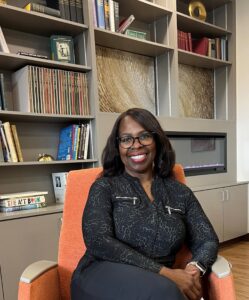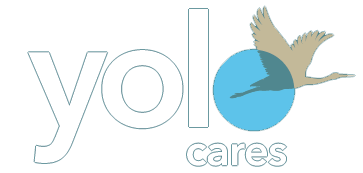Breaking Barriers in Medicine: Advancing DEI
By: Craig Dresang, CEO, YoloCares
 She is unassuming. She is a powerhouse. Her broad blissful smile can be disarming, but make no mistake, Jackie Clark RN, MBA, is a force of nature who knows how to get things done and how to lift people up in the process.
She is unassuming. She is a powerhouse. Her broad blissful smile can be disarming, but make no mistake, Jackie Clark RN, MBA, is a force of nature who knows how to get things done and how to lift people up in the process.
The woman who California appointed as its first CEO for Correctional Healthcare Services, and now serves as the Board Chair for YoloCares, has some insight about the emerging challenges facing both healthcare and the country.
Before her recent retirement, Clark oversaw the care of approximately 5,000 incarcerated patients annually, including one of the only hospice facilities in the country for incarcerated individuals. Clark expanded hospice care and developed a program for patients with Alzheimer’s and dementia. Recognizing the emotional impacts that an inmate’s death can have in the prison community, she also expanded an existing peer support training program to include preparing volunteers to aid hospice patients.
Clark has worked across four decades to increase access to high-quality care for Americans regardless of their station in life. When she first assumed her top leadership role, Los Angeles County was embroiled in a lawsuit for not providing adequate care for the homeless and prison populations. Her assessment of the root causes revealed three big hurdles she would have to address: An archaic care delivery model that was not team-based or interdisciplinary, a 90 percent vacancy rate for physicians, and a lack of professional standards for healthcare workers. “At the time, the State only hired physicians who had significant violations against their license,” she says. “These doctors were not allowed to practice medicine on anyone except prisoners. We cleaned that up right away.”
She continues, “For the first time, we started paying highly competitive salaries. That made a difference in the caliber of clinical staff we could attract.” In addition, Clark developed a partnership with the University of California-San Francisco’s School of Medicine. “As a result, we made San Quentin a clinical rotation site for nurse practitioners and physicians. Then, if they decided to work at San Quentin, we would pay off their student loans. Because of that, we retained a team of brilliant physicians.”
Over time, Clark completely transformed the quality and delivery of healthcare in all of California’s 34 correctional facilities. “I introduced a team-based approach to look at each patient in their totality,” she says. For example, a psychiatric nurse, a clinical nurse, and a social worker would manage someone’s care together as a team with a physician, instead of working separately in silos. The outcome was better, more coordinated, care.
Under her watch, mobile clinics were created to go into Skid Row. Many people in the neighborhood would be arrested and booked into jail for loitering. Often, they were not criminals, just homeless with nowhere to go. Clark says, “Once in jail, we found out they were mentally ill, dealing with drug addiction, diabetic, or unhoused. We had no place to house these people, so the system jailed and failed them. It was a waste of resources and not very humane. It did nothing to help the individual. I always thought that if we could partner with the community and introduce mobile clinics then we could keep some folks out of jail.” The challenge, she explains, “Was a population that no one knew about. They were considered a throwaway community. I always believed that if not for the grace of God, I could be one of them. I saw them as my people, and I wanted to show up for them. If it was me or one of my siblings, I would want access to basic treatment.”
If Clark could change anything about healthcare on a national level it would be to provide equal access. “The most resourced country on the planet still has a tiered system,” she says. “If you are lucky enough to be wealthy or to have the right job with insurance then you have access to healthcare. And now, it seems that our country is going backwards instead of moving forward. I’m not convinced that the new administration understands or really cares about the delivery of high-quality healthcare for every American. The national agenda is not aligned with compassion and care for the less fortunate. It’s disheartening,” according to Clark.
She continues, “The country has become numb to things that used to be unacceptable. You can no longer be comfortable being different. People thought the Holocaust couldn’t happen, but it did.” In every corner of American industry, and especially in healthcare, Clark says, “We should want the best and the brightest which does not necessarily mean the whitest.”
When describing her experience as a black female healthcare executive, Clark has always felt that she had to be better than her white counterparts. “I never wanted to give someone a reason to say that I got a certain position because I am black or am a woman,” she explains. “I put a lot of pressure on myself to be the best. In the end, it paid off because that allowed me to promote into other positions.”
The federal government’s move away from Diversity, Equity and Inclusion (DEI) and Affirmative Action, is deeply troubling to Clark. Contrary to some common beliefs, there are no hiring quotas attached to Affirmative Action or DEI. Historically, Congress has, in a bipartisan fashion, created federal procurement programs to counter the effects of discrimination that have raised artificial barriers for businesses owned by disadvantaged individuals, including women and minorities. Clark says, “Affirmative Action simply gave me, and others, a seat at the interview table. It afforded me the opportunity to show what I could bring to a position. That’s it. The rest was on me.” In 2024, only 9.2 percent of Fortune 1000 CEOs were women. Women and people of color are still underrepresented in roles that lead to CEO positions.
Like watering a garden with Miracle-Gro, “Diversity grows us as humans. It expands our learning and understanding of the world,” says Clark. “It broadens our knowledge and perspectives. Instead of being fearful, we should embrace it.” Multiple studies, particularly from McKinsey & Company, demonstrate the significant value of diversity in the workplace. Companies with higher levels of gender and ethnic diversity tend to outperform their peers financially. In addition, companies with diverse teams show improved innovation, decision-making, and market capture abilities. Companies in the top quartile for diversity are more likely to have superior financial returns compared to those with lower diversity levels.
Serving two separate terms on the YoloCares Board since 2014, Clark says her service is a way she can use her background as a woman, a nurse, and a healthcare administrator to strengthen her community. Her advice to other young women of color: “Your journey is going to be hard, but it will be worth the end goal. No matter what hurdles or pitfalls you encounter, just brush yourself off, stand up, and keep going.”
Her counsel for a nearly 50-year-old YoloCares is the same: “We must keep doing what we are doing. We hire the best and brightest, regardless of color, race, gender, sexual orientation or anything else. Without a commitment to DEI, the best and the brightest may not always get a seat at the table because they are not white. YoloCares wants to ensure that they always do. We cannot lower our standards. This is what makes us an employer of choice and it is what makes our care world class.”
——————————————————————————————————————
NOTE: Jackie Clark lives in Davis with her husband and son. She is one of 11 children and describes her youth as, “growing up poor” in Oxnard, CA. She says, “My dad was a day laborer who always emphasized education as a way to improve your life.” Working fulltime while going to school, Clark began her career as a certified nursing assistant (CNA), who later became a registered nurse (RN) and then achieved an MBA. Regarding her work at YoloCares, she says, “I hope to lean on my background in quality improvement, healthcare policy, change management and government relations to help YoloCares cement its position as a national leader in end-of-life care.” If she had a second career, she says, “I am a dog person. I would open a dog rescue and employ otherwise homeless people to run it.”





Leave a Reply